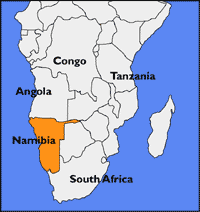|
Africa is almost certainly the birthplace of the human species. From it the earliest people ventured into Asia and then across the long-vanished land bridge to the Americas, or across the Pacific island chains to Australasia. They also spread to the lands north of the Mediterranean Sea. Many thousands of years later their European descendants gained glory and wealth by rediscovering the southern hemisphere, and plundering it. They - we - have often treated it, and its inhabitants, with brutality, indifference and contempt. White Europeans forced black Africans to become slaves. White Europeans deprived black people of their homes and communities and cultures. White Europeans sent their missionaries to change black people's religion to their own. And in the 19th century white Europeans began moving into Africa to occupy the land as well. The land was desirable for itself: it provided new territory, new possessions and new trade, both for individuals and their countries. The land had other values, too: it provided bases for further take-overs and further military threats; and, above all, it contained riches.
Along the coastline of Namibia runs the Namib desert, a 1,200 mile long strip of unwelcoming sand dunes and barren rock. Behind it is the central mountain plateau, and east of that the Kalahari desert. Namibia's scarcest commodity is water: this is a country of little rainfall, and the rivers don't always run. But the very sand of the Skeleton Coast is the dust of gemstones; uranium, tin and tungsten can be mined in the central Namib, and copper in the north; and in the south there are diamonds. Namibia also has gold, silver, lithium, and natural gas. For most of the region's history, only metal was of interest to the native tribes. These tribes lived and traded together more or less peacefully, each with their own particular way of living, wherever the land was fertile enough. The San were nomads, hunters and gatherers. The Damara hunted and worked copper. The Ovambo grew crops in the north, where there was more rain, but also worked in metal. The Nama and the Herero were livestock farmers, and they were the two main tribes in the 1840s when the Germans (first missionaries, then settlers, then soldiers) began arriving in South West Africa.
Before the Germans, only a few Europeans had visited it: explorers, traders and sailors. They opened up trade outlets for ivory and cattle; they also brought in firearms, with which they traded for Namib treasures. Later, big guns and European military systems were introduced. The tribes now settled their disputes with lethal violence: corruption of a peaceful culture was under way.
In the 1880s Germany made South West Africa their own colony, and settlers moved in, followed by a military governor who knew little about running a colony and nothing at all about Africa. Major Theodor Leutwein began by playing off the Nama and Herero tribes against each other. More and more white settlers arrived, pushing tribesmen off their cattle-grazing lands with bribes and unreliable deals. The Namib's diamonds were discovered, attracting yet more incomers with a lust for wealth.
Tribal cattle-farmers had other problems, too: a cattle-virus epidemic in the late 1890s killed much of their livestock. The colonists offered the Herero aid on credit. As a result the farmers amassed large debts, and when they couldn't pay them off the colonists simply seized what cattle were left. In January 1904, the Herero, desperate to regain their livelihoods, rebelled. Under their leader Samuel Maherero they began to attack the numerous German outposts. They killed German men, but spared women, children, missionaries, and the English or Boer farmers whose support they didn't want to lose.
At the same time, the Nama chief, Hendrik Witbooi, wrote a letter to Theodor Leutwein, telling him what the native Africans thought of their invaders, who had taken their land, deprived them of their rights to pasture their animals on it, used up the scanty water supplies, and imposed alien laws and taxes. His hope was that Leutwein would recognise the injustice and do something about it.
|
|
 |

